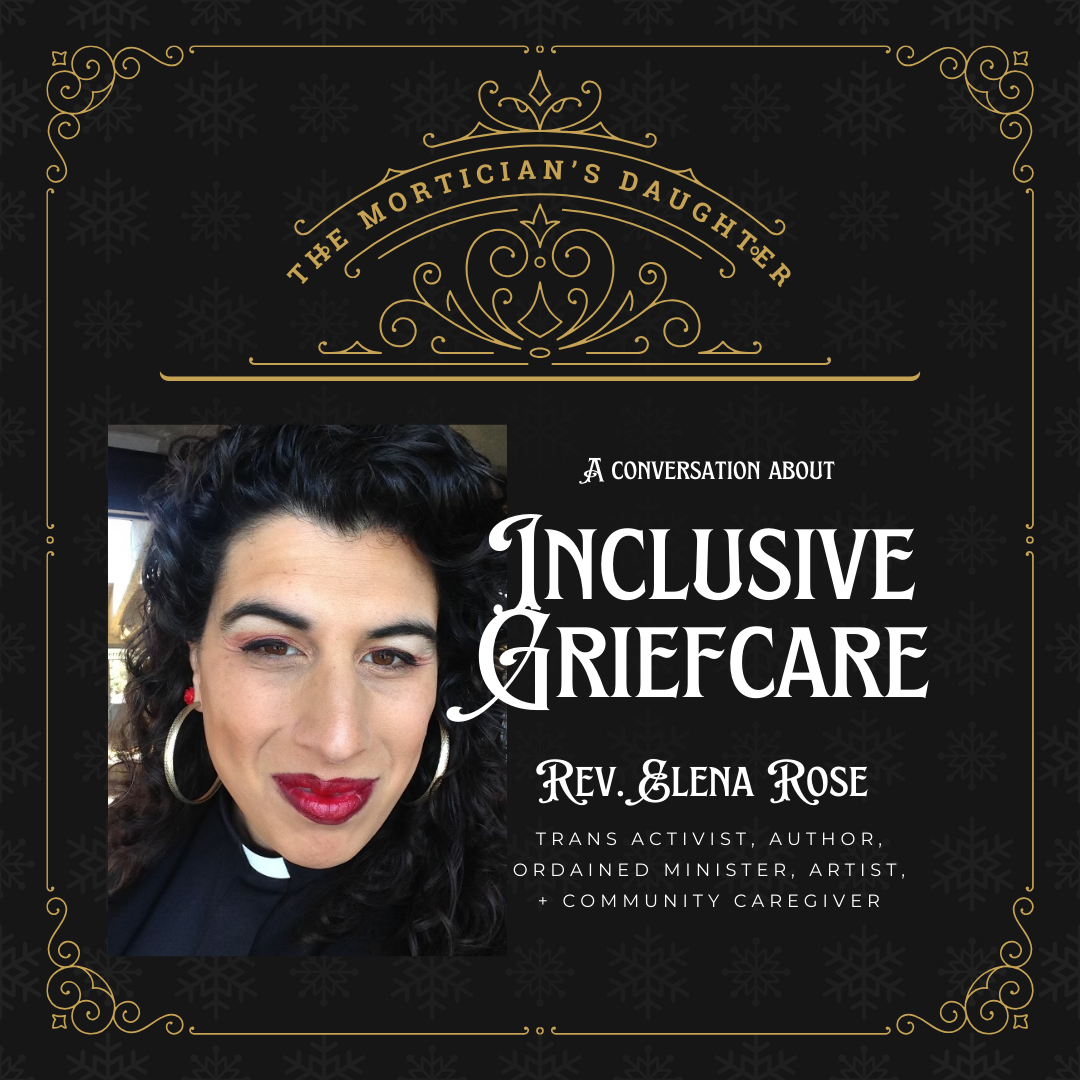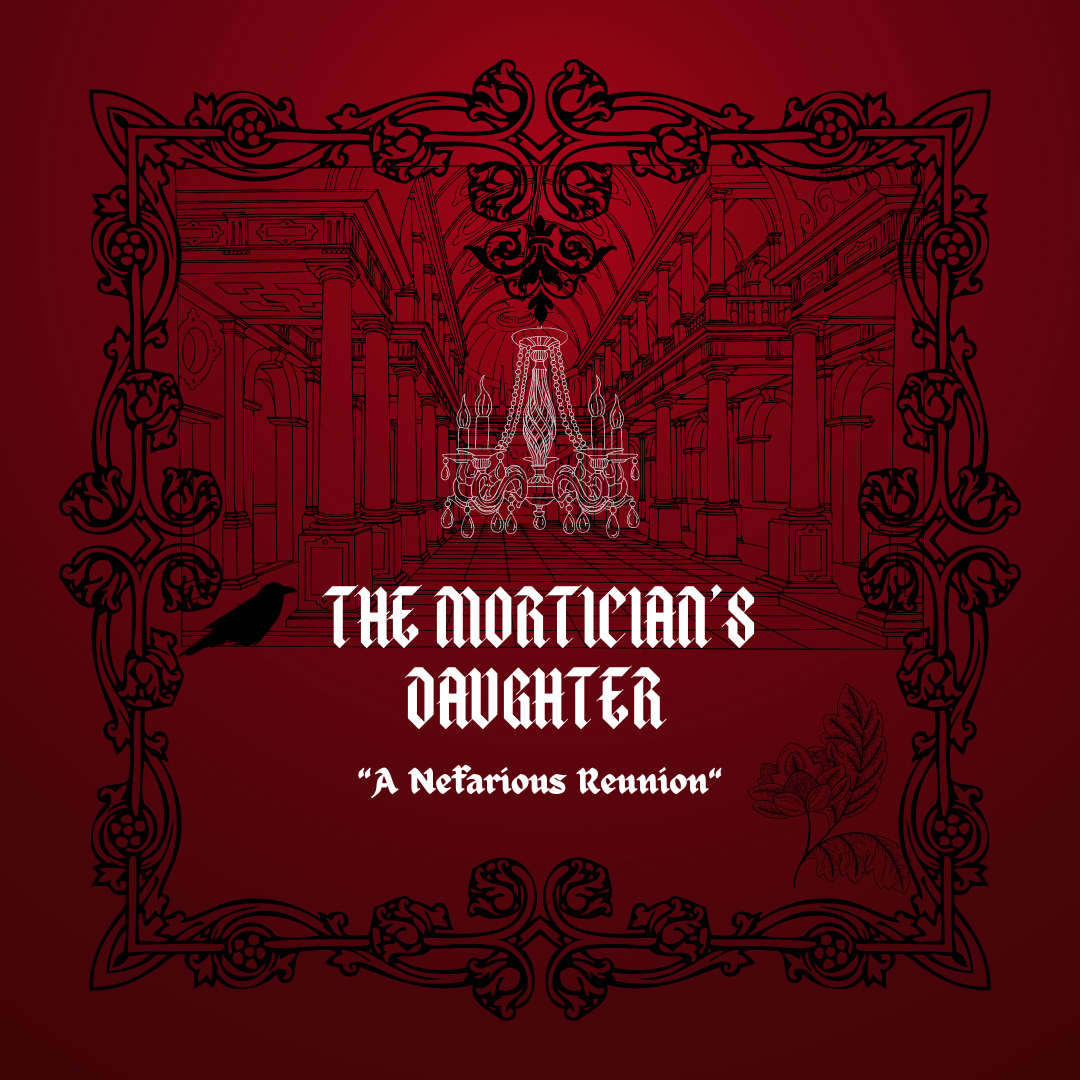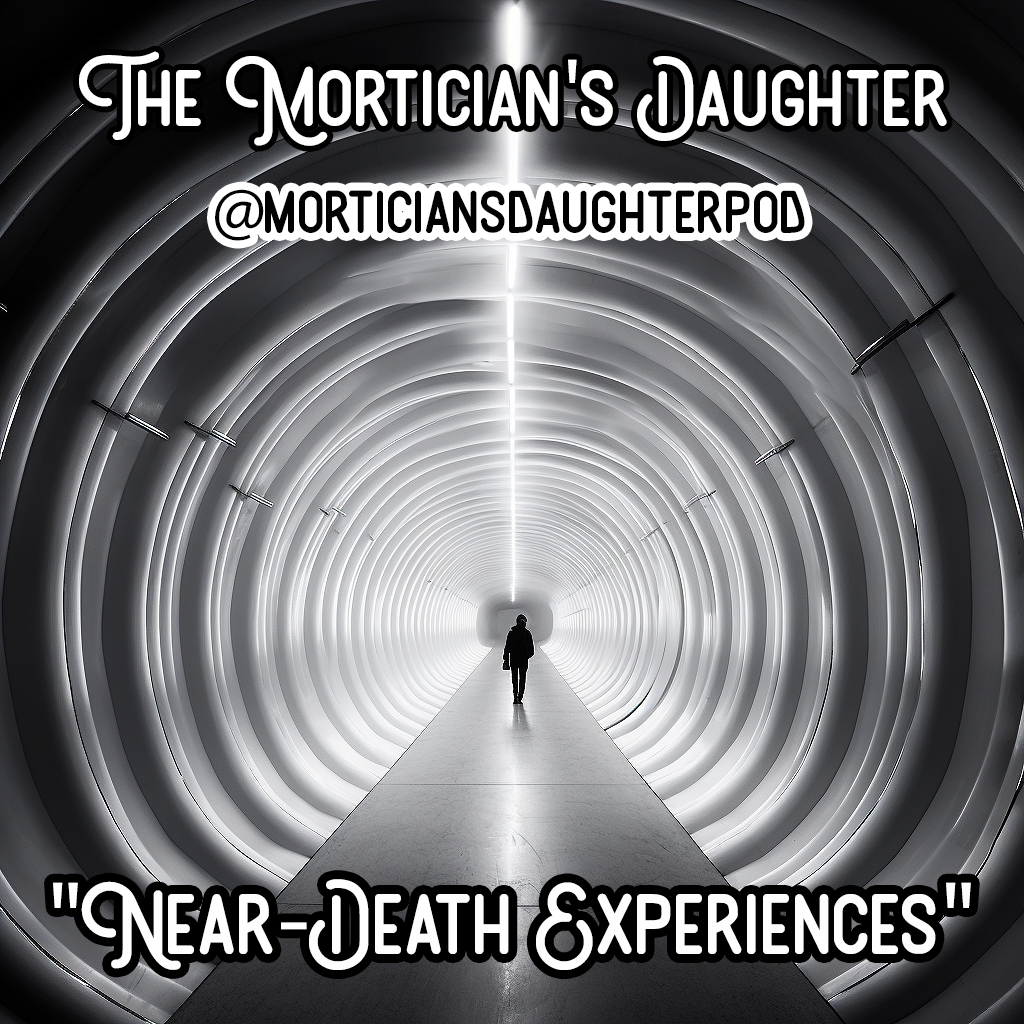Episode Transcript
TMD 009: Reincarnation
Why hello you dashing devils. Wow. What a world we live in. I am broadcasting from a bunker in the desert. Well, not quite, but the ongoing saga of our podcast studio continues. I originally started the show while my fella and I were residing in our art commune, just me and some rapscallion lads, living as best we could while dream-chasing, and that’s where we constructed our first studio. But then we moved so the recording space moved down to YabYum HQ, but with the current pandemic, we’ve had to shift our podcasting operations once again so I’m back on the home front with Eleanor, my familiar, sleeping at my feet while I record this.
But we’re no longer in the commune. Instead we enjoy a smaller, quieter spot - just me and my husband in what might be the strangest neighborhood in Arizona. And, for those familiar with our quirky state, that’s really saying something. True story though. Perhaps we’ll share some stories in episodes to come. Of baby goats and bunny farmers. Or shopping cart castles and produce assaults. Of handmade houses around houses and restored fountains and pint-sized orchards and the hostel that no one ever leaves.
Okay, today, we’re here to talk about reincarnation...no, no, no, not COVID. I’m sure we’re all getting inundated with information on coronavirus on every front - from the nightly news to that dude who got a D in Bio back in high school. And, if you’re lucky, it hasn’t gotten much more personal than that. Still, I think it’s time to take a moment to think about other things.
I mean, we’re still going to talk about death, of course, but let’s focus on a different aspect, like what comes after. And, in this afterlife installment, I’m going to focus on reincarnation.
Now, for those entirely new to this concept, reincarnation refers to the re-birth of one’s soul or essence or non-physical being into a new physical body, usually after one physical body dies. Or, put more simply, you die and then you are reborn as someone, or something, new.
I’m sure we’ve all posed the hypothetical question, “If you could come back as an animal after you die, what animal would want to be?” Does your answer immediately come to mind? Has it changed over time? Is it a dolphin? Personally, I would want to look at a catalog. Are there unknown species, perhaps even alien species, out there? Otherwise, sign me up for house pet status because I’m not a fan of camping. Maybe a cat, though I’m partial to dogs. There’s just something a bit more dignified about cats. So that or maybe a galapagos tortoise.
Anyway, moving along, this question brings up an interesting and important distinction that should be drawn right away: between reincarnation and transmigration. Some would argue that these are different concepts. Reincarnation being the belief that an essence or aspect remains of a person after death and that transcendent piece of you rejoins the interconnected whole of existence, of the universe, of being, or whatever you want to call it based on your individual belief structure.
Transmigration is more like that hypothetical we just posed. You die. Your soul then migrates to another body - be it animal, vegetable or mineral. Wait. I mean, human, animal, or plant. Maybe microbial. And maybe, possible, hopefully, extraterrestrial. Transmigration is more the Shirley McClain method of reincarnation. In one life, you're the sister of a 35,000-year-old spirit named Ramtha in Atlantis and, in another, you're Warren Beatty's sister out in Hollywood. Thank you, Wikipedia for this titillating tidbit.
But, seriously, I don’t mean to make light of transmigration or those who hold to it as a belief here. I’m just poking fun at Shirley McClain and the old bag deserves it. Among her lesser moments, she claimed the victims of the Holocaust were just facing karmic retribution and Stephen Hawking unintentionally gave himself ALS through his awesome subconscious powers so he could focus his brainspace more on physics. That woman is off the holiday card list.
Anyway, I digress. Back to reincarnation and transmigration. It’s interesting to note that the word reincarnation, and we’re going back to Wiki on this, derives from Latin, literally meaning, "entering the flesh again” and a number of religions do equate transmigration with reincarnation, but I did want to highlight the difference because we’ll circle back to it later.
So different religions have different views on reincarnation, but the concept itself is pretty wide reaching. What religions or cultures come to mind when you think about belief in reincarnation? Hinduism? Buddhism? Native American Traditions? Paganism? What about Islam? Or Judaism? When you get down to it, the idea has proliferated well beyond the structural boundaries of religions. For example, in an article published in the Sociology of Religion, it was noted that the "number of westerners interested in reincarnation greatly exceed the numbers of westerners attached to Eastern or New Age religions." Now, how strongly folx believe in reincarnation is another matter of debate.
Nevertheless, roughly 20% identified as holding a belief in reincarnation in numerous surveys according to Tony Walter in his article, “Reincarnation, Modernity and Identity.” But Reader’s Digest put that number around 33%. That means even people who identify as secular or Christian sometimes identify a belief in, or the possibility of, reincarnation. But, looking back at history, this doesn’t seem too surprising.
The earliest references to reincarnation come to us from the Upanishads of Vedic traditions which presents existence as a cycle of death and rebirth known as samsara until the soul eventually enters an enlightened state, thereby achieving nirvana, and escaping the cycle.
You can see this basic structure in several religions that originated in India. Hinduism, Jainism, and Buddhism all hold to the idea of samsara, or the cycle of death and rebirth, with nirvana as the soul’s endgame. And your karma in one life can affect your placement in the next.
Fun note: some Buddhist texts identify five realms within samsara: hells (yes, plural), the realm of hungry ghosts, animals, humans, and gods. Some even stick in a sixth level of demi-gods between humans and gods. So, for all you 21st Century digital kids, life is like a video game. You level up into new and better characters through good karma.
And, for being so glib all the time, I am probably coming back as a slug if karma is extra judgey or has no sense of humor.
Although the notion of reincarnation may have originated in the area we know as modern day India, it didn’t stay there. It expanded either through trade routes or the universal subconscious or some other means.
We see it pop up in the Ancient Grecco-Roman world. Early Greek thinkers held a belief in "a detachable soul or self" that was older than the body and would continue on after the body died. Pythagoras suggested the detachable soul was the carrier of an individual's divinity and their guilt. According to the Stanford Encyclopedia of Philosophy, “Pythagoras believed in metempsychosis or reincarnation, according to which human souls were reborn into other animals after death.” To my understanding, this does include human animals.
And, in Phaedo, Plato claims that prior to his death Socrates says, "I am confident that there truly is such a thing as living again, and that the living spring from the dead."
So it appears there were more options than crossing the River Styx and heading for Hades back in Ancient Greece.
And, when Romans began their mission to make the statement ‘all roads lead to Rome’ true, they encountered other cultures who believe life and death occurred in an ongoing cycle, including the pagans of Gaul, Britain, and Ireland.
Now, it is unclear whether the Greeks or Romans or Pagans believed anything came before or after this cycle of death and rebirth, like many Eastern traditions believe nirvana follows samsara, or if the wheel just endlessly turns. Some philosophers suggested that we were eternal souls trapped in matter as a form of punishment or, maybe, possibly, as a result of our own choice.
Of the Judeo-Chrisitian faiths, there are several traditions that accept reincarnation within their doctrine. Sikhs believe in the "coming and going" cycle of death and rebirth that one must undergo before unity with God can be achieved.
In the kabbalah, we find reincarnation described as gilgul and its acceptance within the Jewish community often extends beyond the mystical and esoteric practitioners, but the idea is universally accepted within Hasidic Judaism and can be found in certain Modern Orthodox groups as well.
Reincarnation among Indigenous North Americans, particularly those of the Midwest and North West, show up in written records of colonizers and the oral traditions and storytelling shared within these communities. In Reincarnation in America; An Esoteric History, Lee Irwin recounts the a story from a Ho Chunk shaman named Thunder Cloud who moved between different earthly forms, including a fish, a bird, a warrior of his tribe, and a buffalo, as well as a pure spirit form in the world above.
We could keep going here, but at this point, I hope it suffices to say that reincarnation or transmigration is a prevalent belief around the world.
This leads to a lot of crazy questions. I mean, if we all die and come back, why don’t we remember anything of our previous lives?
How does it help us become better, more enlightened creatures if we can’t recall what it is we learned?
Okay, so what if it isn't about learning a lesson before we can break out of the cycle of death and rebirth? What if we are just eternal spirits trapped in matter as some form of punishment? Maybe we chose to be here?
These are all great questions. But, let’s get down to it. What’s really on everybody’s mind... is reincarnation a real thing? Like all things in my life, I really have no answers. Only more questions.
I sometimes think I’m nothing more than a giant pile of questions seeking answers and only yielding more questions. I need a Sisphysian visual metaphor for this. Like digging a hole and only covering myself with the dirt as I go deeper.
Soooo, anyway, is reincarnation a thing or not? Depends on who you ask.
Now, it’s been pretty well documented within the pro-reincarnation community that children have frequently said strange things indicative of past life experiences - and some of these instances are more detailed, as well as better documented, than others. It should also be noted that past life claims generally pop up around 2 or 3 and tend to stop somewhere from the age of 5 to 7, but that is not always the case.
Maybe, if you’re a parent or you’ve been around kids, you remember something weird they said that could fit within the framework of a past life experience. One of my nephews once randomly told my brother he was in the French and Indian War when he had not quite reached the tender age of four.
I have to say. That made two skeptics take pause. Then again, I wonder what Noam Chomsky who, amongst other things, studied language acquisition in children, would say about what my nephew might have gleaned in those infantile years before he developed the skill set to speak.
But still… It was freaky.
Children aren’t the only ones to experience previous lives, however. Older individuals have been known to have past life dreams and, later, as hypnotism gained rise, past life regression also gained some popularity.
But let’s get to some examples. And, once again, these are heavily focused in the Western world, but there are far more examples that emerge from India and other countries where reincarnation is the prevalent belief so parents often watch or are more aware of signs of past lives in their children.
One of the more popular stories is that of Ryan Hammond, a boy from Oklahoma, who recalled his prior life in Hollywood as an actor.
It all started when Ryan woke up screaming one night and when his mother rushed into check on him, kept telling her, “Mommy, I’m so homesick.”
As Ryan’s mother tried to soothe her son, he kept revealing strange details about this life he wished to return to. The next day, she went to the library and checked out some books about Old Hollywood.
It was from these books, the Hammonds discovered a still from a 1932 movie called Night After Night. Ryan pointed to one of the extras and identified himself. Cyndi Hammond, Ryan’s mother, didn’t stop there. Even though she and her husband didn’t believe in reincarnation, Ryan’s sorrow which he said was brought on by homesickness made her think twice. So Cyndi did some research and found Dr. JIm Tucker.
With Dr. Tucker’s help, and that of a Hollywood archivist, they were able to connect Ryan to Marty Martyn, an extra and talent agent. Martyn’s living daughter was able to help verify 50 of Ryan Hammond’s statements about his previous life.
Dr. Tucker, now the director of the Division of Perceptual Studies at the University of Virginia, also wrote about James Leininger who started having nightmares shortly after his second birthday about being WWII fighter pilot James Huston.
I think for me the creepiest moment as a parent would be to have my 18-month-old child look up at me while I was changing his diaper and say, in a complete sentence, “When I was your age, I used to change your diaper.”
That’s exactly what happened to Samuel Taylor’s father. In the years to come, Sam would occasionally add to the creepy factor. When he saw a photo of his late grandfather’s first car, he pointed and said, “That’s my car.” At this point, Sam’s mom decided to jump in and test her son with another photograph. Once again, Sam came through and pointed to one young man standing in a group and said, “That’s me,” pointing at his grandfather. But then the child took it a step further and said, that was when the “bad men turned his sister into a fish.” The grandfather’s sister was murdered and her body was found floating in a river around that time.
And in 1991 Sonam Wangdu was born in Seattle. At the age of two, he realized he was the fourth reincarnation of a Tibetan lama which worked out well because the third reincarnation told his followers he would be reborn in Seattle next. When he was five years old, he left his family to head to Kathmandu, Nepal to study Buddhism. He became the head of the monastery where he was studying and there he remains.
Even Kim Kardashian-West has said her son Psalm with husband Kanye might be the reincarnation of ler late father. Her suspicions started after a blind medium told her so in Bali while it was still hush-hush that the couple was expecting via surrogate. I don’t really know where to stick that on the credibility meter.
My favorite story draws a line between London and Ancient Egypt by way of Dorothy Eady. When Eady was a child, her mother took her to the British Museum of London, the city where she was born, but she didn't want to leave the museum. She insisted that she was amongst her real people. She had dreams of Egypt and when she saw a photograph of the Temple of Seti I, she told her father that was where she used to live.
Dorothy Eady married a man from Egypt and moved to Cairo. They had a child named Seti, but the marriage eventually ended. Dorothy believed she was the reincarnation of a priestess of the Temple who killed herself after she became pregnant with Pharaoh Seti's child. Eady became the first woman to join the Antiquities Department in 1956. Through her past life memories, Dororthy was able to help uncover the garden and a hidden tunnel that the archeologists had not yet excavated, both part of the Temple of Seti I.
These accounts take place in the modern western world, but there are countless stories of reincarnation or transmigration throughout history and from around the globe.
Of course, there have been many arguments made in opposition to reincarnation from all sorts of angles, be it philosophical, religious, or mathematical - you know, for those who divide up those things.
And, yes, J.J. MacIntosh does actually provide a mathematical theorem that he argues disproves the belief in 'Reincarnation and Relativized Identity' just in case you were thinking I threw that mathematical bit in there to be funny.
There are a lot of intriguing questions that arise when you really start delving into the philosophy of reincarnation and some of it seems to border on science fiction. Like the multiple occupancy view and questions about posthumous clones. What about temporal gaps between lives?
I mean, I could spend all day talking about this, but I feel like I already have. I guess I just missed you all so much I allowed myself to get caught up in the moment. Well, I’ll just have to get to work on our next episode right away.
Until next time, my dears, please stay well in mind and body. Remember, goonies never say die. And before we meet again, ask yourself, if you could come back as an animal, what animal would you choose?


